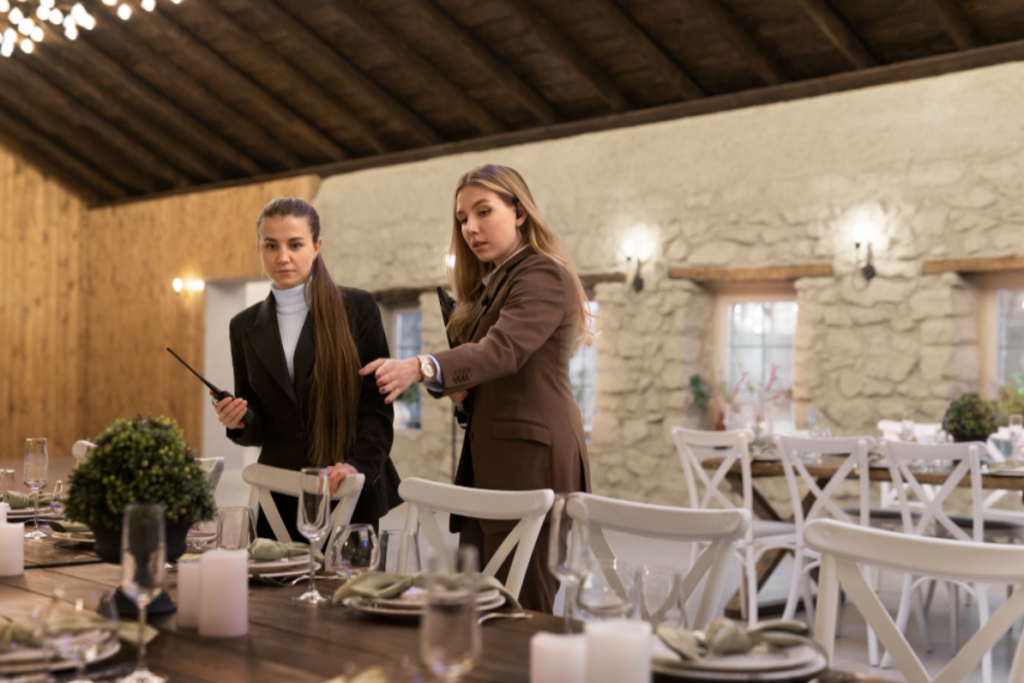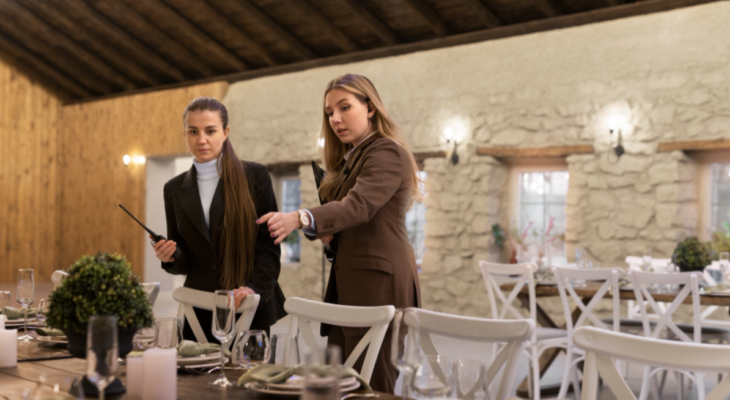
Welcome to the dynamic world of event design, a pivotal element in creating memorable, immersive experiences. As trends continually evolve, staying abreast of these changes is essential.
This blog will explore the latest event design trends and innovative setups, offering insight and inspiration for your next captivating event. Join us as we journey through creativity and innovation at the heart of modern event design.
The Importance of Staying Up-to-Date with Event Design Trends
Staying up-to-date with event design trends is crucial for various reasons:
- Relevance: As society evolves, so do people’s tastes, preferences, and expectations. What was appealing a few years ago may not hold the same allure today. By staying current with design trends, you ensure your events remain appealing and engaging to your audience.
- Innovation: Event design trends often reflect advancements in technology and creative concepts. By keeping up with these trends, you can access fresh, innovative ideas to enhance your event’s uniqueness and overall experience.
- Competitive Edge: In the competitive field of event planning, offering the latest event design can differentiate you from other planners. It shows that you are progressive and ready to adapt, qualities that clients appreciate.
- Audience Engagement: Trendy designs and setups can increase audience engagement. They offer novel experiences that can surprise, delight, and engage attendees more deeply.
- Reflecting Social and Cultural Shifts: Event design trends often mirror wider cultural or societal trends, such as sustainability or inclusivity. Staying current allows your events to reflect these shifts, ensuring they resonate with attendees on a deeper level.
Emerging Event Design Trends
Sustainable and Eco-Friendly Events
The trend towards sustainable and eco-friendly events is a revolutionary wave corporate event planners, and event management agencies can’t afford to ignore. Recognising the urgent need for environmental responsibility, this trend involves designing events with minimal environmental impact – from reducing waste and selecting eco-friendly venues to promoting digital over physical materials.
This green approach resonates with today’s conscious attendees, who appreciate and often expect such mindfulness. The impact on the event industry has been transformative. Beyond merely adding another theme to the planner’s portfolio, sustainability has redefined the ethos of event planning.
Virtual and Hybrid Events
This trend emerged from necessity as the world adapted to remote interactions. Still, it has since become a mainstay in the event industry. Virtual events occur entirely online, while hybrid events blend in-person and virtual elements, expanding the reach beyond geographical constraints.
Technology Behind Virtual And Hybrid Events
The technology powering this trend includes:
- High-quality live-streaming platforms.
- Virtual reality.
- Interactive online tools that foster engagement.
Virtual event platforms allow chat rooms, polls, and Q&A sessions, creating an interactive experience for attendees.
Hybrid events may incorporate live feeds, enabling remote attendees to experience the event in real time. This trend redefines the event landscape, offering new opportunities to connect, engage, and create impactful experiences, irrespective of physical location.
The future of events is digital, and it’s here to stay.
Experiential and Immersive Events
The event industry has seen a significant shift towards experiential and immersive events. All corporate event planners or event management agencies go beyond conventional methods to create these experiences to engage attendees’ senses, emotions, and intellect fully. The aim is to create memorable, impactful experiences that participants feel a part of rather than merely observing.
How To Create An Immersive Experience?
Creating an immersive experience involves meticulous planning. It starts with understanding your audience. The use of AR, VR, and interactive displays can enhance immersion. Unique venues, engaging content, and hands-on activities play crucial roles. Storytelling can weave together the event elements into a cohesive narrative.
In a world where digital interactions are increasingly common, these experiential and immersive events offer a unique, personal touch that can leave lasting impressions and build deeper connections.
Personalised Events
Personalisation is the latest trend that every innovative event management agency increasingly embraces. Personalised events cater to attendees’ preferences, interests, and needs, making them feel valued and enhancing their overall experience.
The Role Of Data In Personalisation
To execute personalisation successfully, data plays an essential role. An event management agency can gain valuable insights into attendees’ preferences by analysing attendee data – from registration information to past event behaviour. This can guide the personalisation of everything from event content, such as tailored sessions or workshops, to personalised communications and marketing.
Moreover, AI can help analyse this data to deliver real-time personalisation, offering recommendations or experiences suited to individual attendees’ preferences during the event.
Ultimately, personalisation turns a generic event into a unique, individualised experience. It enhances attendee engagement, satisfaction, and retention, making your event more impactful and memorable.
Augmented Reality and Virtual Reality in Event Design
All corporate event planners recognise the potential of Virtual Reality and Augmented Reality in event design. Once the domain of gaming and specialised applications, these technologies have permeated the event industry, shaping a trend that’s too impactful to ignore.
How AR And VR Can Enhance the Attendee Experience?
Augmented Reality (AR) enhances the user’s real-world experience by superimposing digital information or images onto their view. On the other hand, Virtual Reality (VR) provides a fully immersive digital experience, transporting users to different realities.
Both offer unique, immersive, and interactive experiences that can vastly enhance attendee engagement. For instance, AR can provide interactive event maps or add a layer of digital engagement to physical event spaces. VR can give virtual venue tours, immersive product demonstrations, or facilitate remote event participation.
Incorporating AR and VR in your event design strategy can transform the attendee experience, making it more engaging, memorable, and impactful.
Interactive Displays and Digital Signage
Interactive displays and digital signage are dynamic trends that every forward-thinking corporate event planner should leverage.
Interactive displays allow attendees to engage with content actively, hands-only, whether it’s a touch screen information kiosk, interactive product demonstration, or a digital art installation.
Digital signage, on the other hand, can deliver dynamic, real-time information, from event schedules to social media feeds.
Benefits Of Interactive Displays In Event Design
- Interactive displays promote active participation, driving up attendee engagement.
- They create deeper, more profound learning experiences.
- Interactive displays can collect valuable attendee preferences and behaviour data, informing future event design decisions.
- Digital signage streamlines communication, ensuring attendees are constantly updated with the latest information.
- It aids in directing attendee flow, improving the overall organisation of the event.
- Digital signage can amplify your event’s social media presence, extending the event’s reach beyond the venue.
- These technologies can transform static events into dynamic, interactive experiences.
- Ultimately, they contribute to creating engaging and memorable events.
Final Words
Embracing these trends in event design can be a game-changer, offering enhanced experiences that captivate your audience. As you plan your next event, consider how these innovative approaches can elevate your event to new heights.
The future of event design trends promises even more exciting advancements, driving us towards more interactive, personalised, and unforgettable experiences. Stay tuned, stay inspired, and let’s shape memorable events together!

